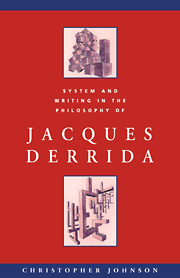Book contents
- Frontmatter
- Contents
- Acknowledgements
- List of abbreviations
- Introduction: From language to writing: the interdisciplinary matrix
- 1 The passion of inscription (‘Force et signification’)
- 2 Infinity, inscription, the economy
- 3 Beyond the seen of writing (‘Freud et la scène de l'écriture’)
- 4 The element of play (écart, entame, [en]taille, articulation/double bande, tomber)
- 5 Evolution and the ‘life’ sciences
- Conclusion Metaphor and more than metaphor
- Notes
- Bibliography
- Index of names
- Subject index
- CAMBRIDGE STUDIES IN FRENCH
4 - The element of play (écart, entame, [en]taille, articulation/double bande, tomber)
Published online by Cambridge University Press: 10 November 2009
- Frontmatter
- Contents
- Acknowledgements
- List of abbreviations
- Introduction: From language to writing: the interdisciplinary matrix
- 1 The passion of inscription (‘Force et signification’)
- 2 Infinity, inscription, the economy
- 3 Beyond the seen of writing (‘Freud et la scène de l'écriture’)
- 4 The element of play (écart, entame, [en]taille, articulation/double bande, tomber)
- 5 Evolution and the ‘life’ sciences
- Conclusion Metaphor and more than metaphor
- Notes
- Bibliography
- Index of names
- Subject index
- CAMBRIDGE STUDIES IN FRENCH
Summary
Mais la langue n'est que l'un de ces systèmes de marques qui ont tous pour propriété cette étrange tendance: accroître simultanément les réserves d'indétermination aléatoire et les pouvoirs de codage ou de surcodage, autrement dit de contrôle et d'auto-régulation.
(MC, p. 5)(Language, however, is only one among those systems of marks that claim this curious tendency as their property: they simultaneously incline towards increasing the reserves of random indetermination as well as the capacity for coding and overcoding or, in other words, for control and self-regulation.)
(TC, p. 2)Que se passe-t-il quand des actes ou des performances (discours ou écriture, analyse ou description, etc.) font partie des objets qu'ils désignent? Quand ils peuvent se donner en exemple de cela même dont ils parlent ou écrivent?
(CP, p. 417)(What happens when acts or performances (discourse or writing, analysis or description, etc.) are part of the object they designate? When they can be given as examples of precisely that of which they speak or write?)
(PC, p. 391)It has sometimes been the case in the preceding analyses that Derrida's argument is characterized by, and in certain instances may even turn upon, an element of verbal play. Such play is not simply confined to isolated puns or homonyms, but can assume the proportions of a highly organized system of associations, so that the reader is confronted with what appears to be an extremely stylized manner of argumentation, in which the effect of words is constantly felt.
- Type
- Chapter
- Information
- System and Writing in the Philosophy of Jacques Derrida , pp. 109 - 141Publisher: Cambridge University PressPrint publication year: 1993



